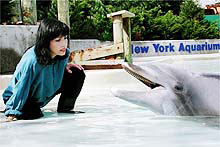
Dr. Diana Reiss Hunter College Wildlife Conservation Society Thursday, 18 October 2007 7:30 pm Performing Arts Center Auditorium Monmouth Regional High School (click here for directions) 1 Norman J Field Way Tinton Falls, NJ Refreshments and informal discussion will follow the lecture Free and Open to the Public

Do other animals share with us a sense of self? Do other animals have the ability and interest to use a mirror to view themselves? How big and complex a brain does it take to recognize that the one staring back at you in a mirror - is you! Dr. Diana Reiss is a cognitive psychologist at Hunter College and a research fellow at the Wildlife Conservation Society who will present her research showing that dolphins and elephants, along with great apes and humans, are members of an exclusive club whose members recognize themselves in mirrors.
Diana Reiss is a cognitive psychologist and Professor in the Department of Psychology at Hunter College, CUNY. She was the founder and director of the Marine Mammal Research Program at the Osborn Laboratories of Marine Science at the New York Aquarium of the Wildlife Conservation Society (WCS) and served as co-chair of WCS's Animal Enrichment Program from 1998 through 2007. Dr. Reiss's research focuses on marine mammal cognition and communication, comparative animal cognition, and the evolution of intelligence. Her past work includes cognitive studies with interactive keyboards with dolphins to investigate their cognitive and communicative abilities and marine mammal communication and behavior. Recently Dr. Reiss and her colleagues demonstrated that dolphins and Asian elephants possess the rare ability for mirror self-recognition previously thought to be restricted to humans and great apes. Her work also involves the rescue and rehabilitation of stranded marine mammals including the successful rescue of the renowned Humphrey, the humpback whale in the San Francisco Bay waters. Dr. Reiss was one of the scientists instrumental in the campaign to protect dolphins from being killed in tuna nets that resulted in the labeling of "dolphin safe" tuna cans. She is currently involved in a campaign to end the killing of dolphins in the dolphin drives in Japan. Diana's work has been published in numerous international scientific journals and has been featured in many television science programs, included Nature, National Geographic, Wild Kingdom, the Today Show and several BBC nature shows.
The Norman J Field Lectures in Science were established in 1991 in memory of Dr. Norman J Field, and are cosponsored by the Monmouth County Section of the American Chemical Society, Monmouth Regional High School, the Monmouth County School Boards Association, and by the Rutgers University Chapter of Sigma Xi, an international scientific research society. Dr. Field was widely recognized for his contributions in the area of public education. He maintained a lifelong personal and professional interest in scientific issues. It is hoped that this lecture series will serve to promote similar interest in science and science education among both younger and older members of the community.
For additional information please contact:
Ken Field
ken@kenfield.org